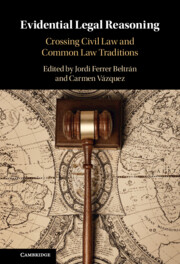Book contents
- Evidential Legal Reasoning
- Evidential Legal Reasoning
- Copyright page
- Contents
- Figures
- Tables
- Contributors
- Introduction
- Part I Evidence As an Area of Knowledge
- Part II Convergences between Systems
- Part III On Evidential Inferences
- 7 Group Deliberative Virtues and Legal Epistemology
- 8 On Probatory Ostension and Inference
- 9 Inferences in Judicial Decisions About Facts
- 10 Silence as Evidence
- 11 Sanctions for Acts or Sanctions for Actors?
- Part IV Expert Evidence
- Part V Standards of Evidence As Decision-Making Rules
- Index
- References
10 - Silence as Evidence
from Part III - On Evidential Inferences
Published online by Cambridge University Press: 05 May 2022
- Evidential Legal Reasoning
- Evidential Legal Reasoning
- Copyright page
- Contents
- Figures
- Tables
- Contributors
- Introduction
- Part I Evidence As an Area of Knowledge
- Part II Convergences between Systems
- Part III On Evidential Inferences
- 7 Group Deliberative Virtues and Legal Epistemology
- 8 On Probatory Ostension and Inference
- 9 Inferences in Judicial Decisions About Facts
- 10 Silence as Evidence
- 11 Sanctions for Acts or Sanctions for Actors?
- Part IV Expert Evidence
- Part V Standards of Evidence As Decision-Making Rules
- Index
- References
Summary
This paper examines the position taken and the discourse on the right of silence in Singapore. By position, I mean what the law is and how it got there. By discourse, I mean how officials talk when they go about defending legislative amendments or praising the current law. Does the experience in Singapore reveal a distinctly Asian perspective to the right of silence? The study of Singapore will be used as a springboard for theoretical reflections on the right in general. I hope to illustrate or instantiate this general point: while evidential reasoning is primarily theoretical; it is legally regulated by rules that are often shaped by practical – including political and ethical – considerations.
- Type
- Chapter
- Information
- Evidential Legal ReasoningCrossing Civil Law and Common Law Traditions, pp. 171 - 197Publisher: Cambridge University PressPrint publication year: 2022

